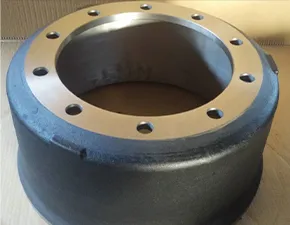Exploring the Features and Benefits of the 87101B Brake Drum for Enhanced Vehicle Performance
Understanding the 87101B Brake Drum A Key Component in Automotive Safety
In the automotive industry, safety is paramount. One of the most crucial components contributing to vehicle safety is the brake system, particularly the brake drum. Among various brake drum models, the 87101B brake drum emerges as a vital part for numerous vehicles, ensuring efficient braking performance. Understanding its features, installation, and maintenance is essential for both vehicle owners and automotive technicians.
What is a Brake Drum?
A brake drum is a cylindrical component that forms part of a drum brake system. When the driver applies the brakes, friction material on brake shoes pushes against the inner surface of the drum. This action creates the necessary force to slow down or stop the vehicle. Brake drums are typically made of cast iron or steel, designed to withstand high temperatures and pressures generated during braking.
Features of the 87101B Brake Drum
The 87101B brake drum is known for its robust construction and reliability
. Some notable features include1. Durable Material Constructed from high-quality cast iron, the 87101B brake drum is designed to endure high-stress conditions while ensuring prolonged service life.
2. Precision Engineering This particular model is manufactured with precision, providing an optimal fit for a wide range of vehicles, which aids in consistent performance and stability.
3. Thermal Stability The design of the 87101B drum allows for effective heat dissipation. During braking, excess heat can lead to brake fade, significantly reducing braking efficiency. The 87101B is engineered to mitigate this risk, thereby enhancing safety.
4. Corrosion Resistance Many environments can lead to corrosion, which can compromise the structural integrity of brake components. The 87101B features a protective coating that helps to resist rust and corrosion, ensuring it maintains its functionality over time.
87101b brake drum

Installation and Maintenance
Proper installation and maintenance of the 87101B brake drum are crucial for optimal performance. Installation should be carried out by trained professionals who can ensure that all components are correctly aligned and secured. Here are some important steps in the installation process
1. Preparation Before installation, ensure that the vehicle is safely lifted and secured. Remove the wheel and any components obstructing access to the brake assembly.
2. Inspection Examine the brake assembly for any signs of wear or damage. Check the brake shoes, springs, and hardware for replaced as needed.
3. Installation of Brake Drum Carefully fit the 87101B brake drum onto the axle. Ensure that it is seated correctly and free of debris that could hinder its operation.
4. Adjustment Once installed, adjust the brake shoes to ensure a proper fit against the drum. This step is vital for maximizing the braking efficiency and response.
5. Testing After installation, conduct a brake test in a safe environment to ensure everything functions as intended.
Conclusion
The 87101B brake drum plays a crucial role in ensuring the safety and reliability of vehicles equipped with drum brake systems. Understanding its features, proper installation, and maintenance practices can significantly enhance brake performance and vehicle safety. As automotive technology continues to evolve, components like the 87101B remain fundamental in providing the necessary safety mechanisms that protect drivers and passengers alike. For vehicle owners and technicians, staying informed about such components is essential for responsible vehicle maintenance and safety on the road.
-
The Power and Reliability of Brake DrumsNewsAug.27,2025
-
The High-Quality Truck Brake DrumsNewsAug.27,2025
-
Quality Brake Drums for Reliable PerformanceNewsAug.27,2025
-
Get the Quality Semi Trailer Brake Drums for Your FleetNewsAug.27,2025
-
Everything You Need to Know About Brake DrumsNewsAug.27,2025
-
Enhance Your Vehicle's Performance with Reliable Brake DrumsNewsAug.27,2025
-
Truck Drum Brake Spring Replacement ProcedureNewsAug.22,2025


